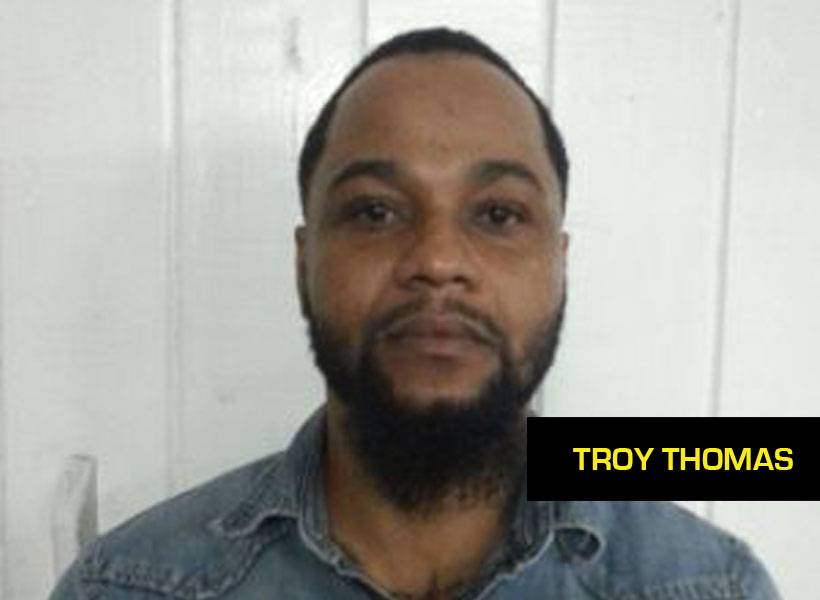High Court Judge Jo-Ann Barlow today (June 15, 2018) ruled that Principal Magistrate Sherlock Isaacs-Marcus is free to continue hearing extradition proceedings for Troy Thomas, who is wanted in the US for second degree murder and criminal possession of a weapon.
The judge, therefore dismissed a Fixed Date Application (FDA) filed by Thomas’ lawyers, which sought to challenge the extradition on several grounds.
The judge also refused the declarations requested by Thomas who was ordered to pay $150,000 in cost to the State.
The State was represented by Solicitor General Kim Kyte and Assistant Solicitor General Beverly Bishop-Cheddie.
In 2012, US law enforcement had issued a wanted bulletin for Thomas in relation to the December 11, 2011 murder of 20-year-old Keith Frank, who was a Guyanese.
Frank, who moved to Queens, New York from Guyana when he was just 12, was shot and killed outside a South Richmond Hill, New York party where he came across some other men with whom he had an ongoing “beef.”
Thomas was apprehended by local police in March at Liliendaal, Greater Georgetown and was hauled before Principal Magistrate Sherdel Isaacs- Marcus, who was at the time acting as Chief Magistrate, before whom he was facing extradition proceedings.
He is currently a remand prisoner.
Lawyers for Thomas, Nigel Hughes, Bernard DaSilva and Darren Wade, filed the FDA on April 6, and among other things, contended that the 1931 extradition treaty between the United States and the United Kingdom were not incorporated into domestic laws.
Addressing this contention in her ruling, the Judge said that this issue has engaged the courts of this country and has been answered in the affirmative on several occasions.
Referencing cases from the West Indian Law Reports; in particular, a case heard before the then Justice Small, Justice Barlow said that Small posited that the incorporation of the treaty within the laws of Guyana was done and completed before the Fugitive Offenders Act of 1988.
It was also for the judge to consider whether there is an applicable arrangement between the United Kingdom and Guyana for the extradition of fugitive offenders.
According to the High Court Judge, Vice President and Minister of Foreign Affairs, Carl Greenidge confirmed the existence of this arrangement which remains enforced in Guyana.
The Judge revealed, “On the 19th January, (2018) Vice President and Minister of Foreign Affairs Carl Greenidge issued a certificate indicating and confirming the existence of an agreement made between the United Kingdom and the United States. That certificate indicates that the arrangement extends to, and remains enforced in Guyana.”
The Judge told the court that since 1988, after the repeal of those applied Acts, several requests were sent to Guyana for the extradition of persons from Guyana to the United States. On this premise, she cited the cases of Barry Dataram, Terrence Sugrim and Steven King who all battled extradition.
“These all show that between the parties there still exists an arrangement which sees proceedings taking place for the extradition of a citizen or person by a requesting state,” asserted the Judge.
Lawyers for Thomas had also argued that his detention is in breach of Article 139 of the Constitution of Guyana.
Thomas had argued that his constitutional right not to be deprived of his “personal liberty” is being infringed by Section 83 B of the Fugitive Offenders Act of 1988.
The Judge, however, noted that the very Constitional provisions under which Thomas is relying limits that personal liberty. She said that Article 139 1 (i) of the Constitution of Guyana provides that the liberty may be restricted for lawful means, therein set out.
She added that the section outlines that applicant’s, in this case Thomas, liberty may be restricted if they are proceedings for his extradition or for the purposes of restricting him while he is being conveyed through Guyana, in the course of his extradition, or for the removal from this country to another.
She, therefore, concluded that Section 83 B of the Fugitive Offenders Act is a lawful and Thomas’s liberty being curtailed subject to these proceedings, cannot be viewed as unconstitutional.
“The court therefore rules that there is no breach of his constitutional right under Article 139 of the Constitution.”











